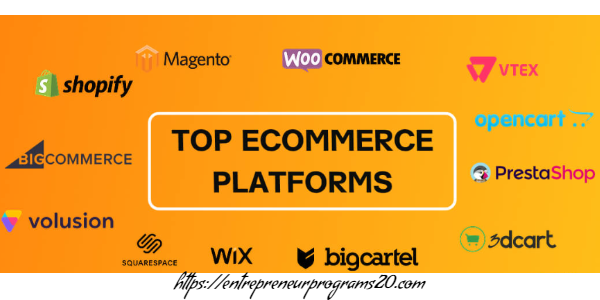In the ever-evolving landscape of online business, e-commerce platforms serve as the backbone for companies looking to establish and expand their digital presence.
These platforms provide the necessary infrastructure and tools to facilitate online transactions, manage inventory, and seamlessly engage with customers.
Understanding the significance of e-commerce platforms is crucial for any business venturing into the realm of online selling.
Explanation of E-Commerce Platforms and Their Importance
An e-commerce platform refers to a software application that enables businesses to create, manage, and operate online stores.
It provides a centralized hub for managing product listings, processing payments, and handling customer inquiries.
The importance of these platforms cannot be overstated in today’s digital economy, where online shopping has become increasingly prevalent.
The right e-commerce platform can significantly impact a business’s growth trajectory and customer satisfaction levels.
By leveraging the functionalities offered by these platforms, businesses can streamline their operations, reach a wider audience, and deliver an exceptional shopping experience.
Whether it’s enhancing product discoverability through robust search capabilities or optimizing checkout processes for seamless transactions, the features provided by e-commerce platforms play a pivotal role in driving success in the online marketplace.

Acknowledging the Variety of Platforms Available
One of the defining characteristics of the e-commerce landscape is the sheer variety of platforms available to businesses.
From industry giants like Shopify and Magento to niche solutions catering to specific business models, the options are virtually endless.
This diversity underscores the importance of making an informed decision when selecting an e-commerce platform.
Each platform comes with its own set of features, pricing structures, and customization options.
Understanding the unique requirements of your business is essential for identifying the platform that best aligns with your goals and objectives.
Whether you’re a small boutique looking to establish an online storefront or a large enterprise seeking to scale operations, there’s a platform out there tailored to your needs.
Understanding Your Business Needs; Before diving into the intricacies of e-commerce platforms, it’s imperative to first understand your business needs and objectives.
Identifying your goals will serve as a guiding principle when evaluating different platform options and determining the features that are most critical for your success.
Identifying Business Goals and Alignment with E-Commerce Features; Consider what you aim to achieve through your online store. Are you looking to increase sales, expand your customer base, or improve operational efficiency?
By clearly defining your objectives, you can prioritize features that directly contribute to these goals.
For instance, if your primary objective is to drive sales, you’ll want a platform with robust marketing and promotional tools to attract and retain customers.
The Importance of Scalability and Flexibility; Scalability is another crucial factor to consider when selecting an e-commerce platform.
As your business grows, you’ll need a platform that can accommodate increased traffic, higher order volumes, and expanding product catalogs.
Look for solutions that offer scalability and flexibility, allowing you to seamlessly adjust your online presence as your business evolves.
Considering Product Type and Inventory Size; The nature of your products and the size of your inventory will also influence your choice of e-commerce platform.
For businesses selling physical goods features such as inventory management, order tracking, and shipping integrations are paramount.
Conversely, if you’re selling digital products or services, you’ll need a platform that supports digital downloads and subscription billing models.
Analyzing E-Commerce Platform Features; Once you’ve identified your business needs and objectives, it’s time to delve into the key features offered by e-commerce platforms.

These features can vary significantly depending on the platform, so it’s essential to carefully evaluate each option to ensure it aligns with your requirements.
Key Features to Look For
- Payment Processing: Seamless and secure payment processing capabilities are essential for any e-commerce platform. Look for solutions that support multiple payment gateways and offer built-in fraud detection mechanisms to safeguard transactions.
- SEO Capabilities: Search engine optimization (SEO) plays a critical role in driving organic traffic to your online store. Choose a platform that prioritizes SEO best practices, such as customizable meta tags, clean URL structures, and mobile responsiveness.
- Mobile Optimization: With an increasing number of consumers shopping on mobile devices, mobile optimization is no longer optional—it’s a necessity. Ensure that the platform you choose provides a responsive design that delivers a consistent user experience across all devices.
- User Experience and Design Customization: The look and feel of your online store can have a significant impact on customer perception and engagement. Seek out platforms that offer extensive design customization options, allowing you to create a visually appealing and intuitive shopping experience.
- Security Features: Protecting customer data is paramount in today’s digital landscape. Look for platforms that prioritize security measures such as SSL encryption, PCI compliance for payment processing, and regular security updates to mitigate potential risks.
Security and Compliance Considerations
Protecting customer data and ensuring compliance with legal standards are essential for building trust and credibility with your audience.
Necessity of Security in Protecting Customer Data; Data breaches and security incidents can have devastating consequences for businesses, leading to financial loss, reputational damage, and legal liabilities.
Prioritize platforms that implement robust security measures to safeguard sensitive information, such as credit card details and personal identifiers.
Compliance with Legal Standards; In the realm of e-commerce, compliance with legal standards is non-negotiable. Depending on your target market and the nature of your business, you may be subject to various regulations and requirements.
For example, businesses that process credit card payments must comply with the Payment Card Industry Data Security Standard (PCI DSS), which sets forth guidelines for securing payment card data.
Similarly, businesses serving customers in the European Union must adhere to the General Data Protection Regulation (GDPR), which governs the collection, processing, and storage of personal data.
Costs and Support: Calculating Total Investment; When evaluating e-commerce platforms, it’s essential to consider not only the upfront costs but also the total investment required to maintain and support your online store.
From subscription fees to transaction charges, understanding the financial implications is crucial for making informed decisions about your e-commerce strategy.
Video
Examining Various Types of Costs
- Upfront Costs: These include initial setup fees, customization expenses, and any hardware or software investments required to launch your online store.
- Subscription Fees: Many e-commerce platforms operate on a subscription-based pricing model, where businesses pay a recurring fee for access to the platform’s features and services. Consider the scalability of your chosen plan and whether it aligns with your projected growth trajectory.
- Transaction Fees: Some platforms charge a percentage of each transaction processed through their system. While these fees may seem nominal at first glance, they can add up over time, especially for high-volume sellers.
- Hidden Costs: Be mindful of hidden costs such as add-on features, integrations, and upgrades that may not be included in the base subscription package. Factor these expenses into your budget to avoid any surprises down the line.
In addition to features and functionality, security and compliance considerations should also be top of mind when selecting an e-commerce platform.
Value of Customer Support and Service
The value of customer support and service cannot be overstated in the realm of e-commerce. Beyond providing a product or service, businesses must prioritize building lasting relationships with their customers.
Prompt and reliable customer support serves as a pillar of trust, demonstrating a commitment to addressing inquiries, resolving issues, and ensuring a positive experience throughout the buyer’s journey.
In the highly competitive online marketplace, exemplary customer service not only fosters loyalty but also acts as a powerful differentiator, setting businesses apart from their competitors.
By investing in robust support channels, businesses can cultivate strong customer relationships, drive repeat purchases, and ultimately, foster long-term success in the dynamic world of e-commerce.
In the world of e-commerce, timely and reliable customer support can make all the difference.
Look for platforms that offer responsive support channels, whether it’s through live chat, email, or phone, to address any technical issues or concerns that may arise.
Additionally, consider the availability of online resources such as knowledge bases, tutorials, and community forums that can help you troubleshoot problems and optimize your store’s performance.
In conclusion
The world of e-commerce platforms offers boundless opportunities for businesses to thrive in the digital age.
By understanding the importance of selecting the right platform, aligning it with their unique business needs, and prioritizing security, compliance, and cost-effectiveness, companies can unlock the full potential of online selling.
As technology continues to evolve and consumer preferences shift, staying agile and adaptable is key to sustained success in the ever-changing e-commerce landscape.
With careful consideration and strategic investment, businesses can harness the power of e-commerce platforms to drive growth, enhance customer satisfaction, and unlock new avenues for innovation and expansion.
